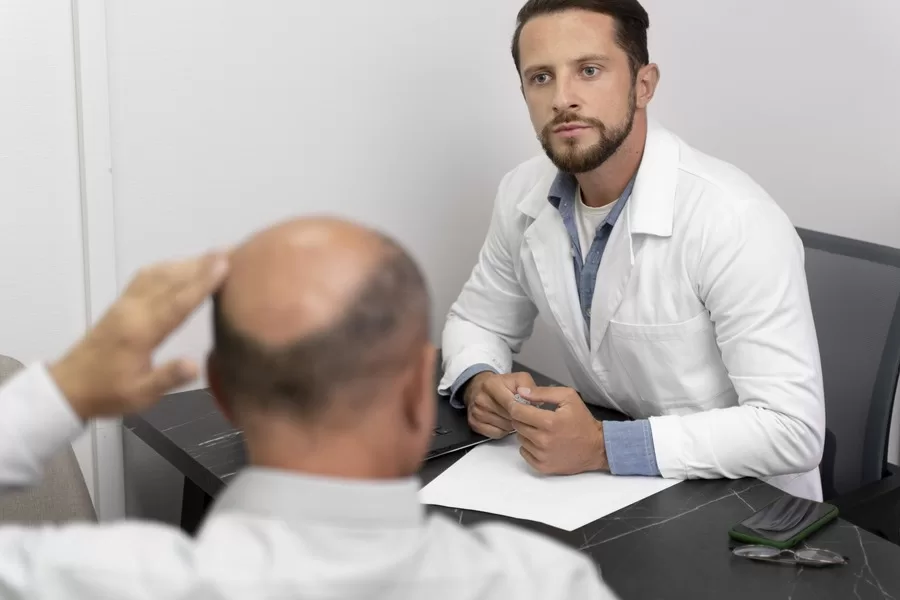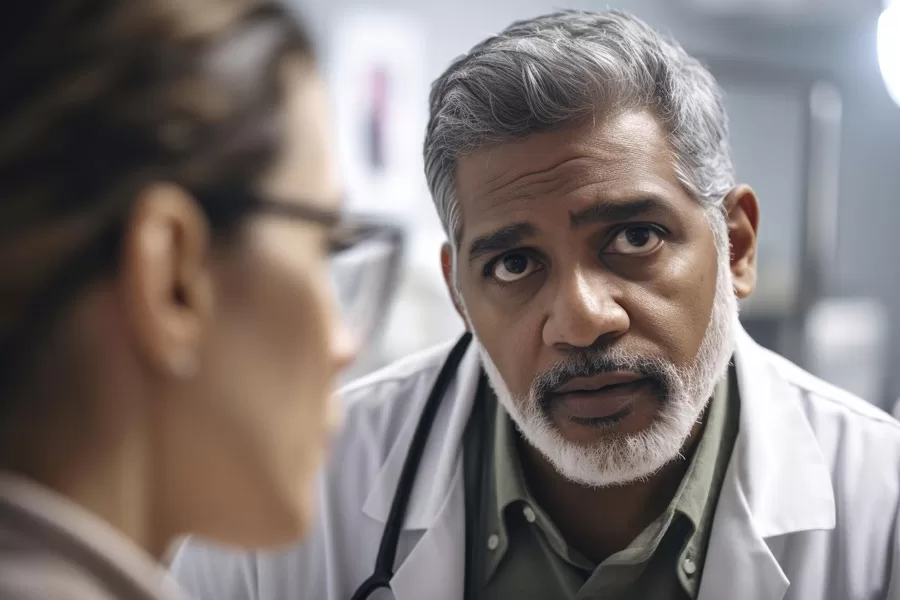
Are you feeling a bit off your game lately? It might be more than just the ups and downs of everyday life. Testosterone Replacement Therapy (TRT) could be the answer to rejuvenating your energy levels, mood, and overall health. But, like any medical treatment, it’s crucial to weigh the benefits and risks.
Testosterone Replacement Therapy
This hormone isn’t just about macho muscles and manliness; it’s crucial for both men and women, influencing everything from our bone strength to how chipper we feel. When levels dip too low, TRT might step in to help get things back on track.
Figuring Out If TRT Is for You
Primarily, TRT comes to the rescue for people suffering from hypogonadism, a fancy term for a body that’s a bit stingy on producing testosterone. It’s not about adding extra; it’s about filling the gap. Signs of testosterone deficiency can be subtle or quite noticeable: think about feeling drained, irritable, muscles becoming soft, or simply losing interest in the bedroom.
But it’s not a decision to take lightly. Teaming up with a healthcare pro is the best way to figure out if TRT is your best move. They’ll look at the whole picture: your symptoms, your lifestyle, and any other health stuff you’ve got going on.
Expecting the Upsides of TRT
People often notice they feel more energetic, like they’ve got a new lease on life. Muscles might perk up, bones get tougher, and that foggy feeling in your brain might clear up. And yes, for many, it brings back that loving feeling that might have gone missing.
But TRT isn’t a miracle cure. It’s a path that you and your doctor will walk down together, keeping an eye on how things go and making tweaks as needed. It’s about personalizing things to fit just right for you, making sure you’re getting the benefits while keeping an eye out for any side effects. In the end, it’s all about getting you back to feeling like the best version of yourself, safely and sensibly.
Types of TRT
- Super Shots (Injections): These are like quick boosts to your system. Testosterone is injected directly into your muscles, usually every two to three weeks. It’s fast, efficient, and gets straight to the point, making it a popular choice for many.
- Smooth Gels: Imagine starting your day with a quick rub of gel on your skin, infusing you with the energy you need. These gels are applied daily, soaking testosterone directly into your bloodstream.
- Handy Patches: Stick one of these on your skin, and you’re good to go for 24 hours. It’s a slow, steady release of testosterone, making it a chill choice for those who prefer a “set it and forget it” approach. Watch out for skin irritation, though – not everyone’s a fan of the adhesive.
- Quick-dissolve Tablets: Pop a tablet on your gum or inner cheek, and let it do its magic, releasing testosterone into your bloodstream. It’s a twice-daily routine that’s discreet and straightforward.
- Long-lasting Pellets: For those who dislike daily routines, these pellets are a long-term commitment. Inserted under the skin by a professional, they slowly release testosterone over several months.
Possible Side Effects
Testosterone Replacement Therapy, known as TRT, is often considered by those experiencing the woes of low testosterone. While it can usher in a new wave of vitality, understanding the full scope of its risks is essential for anyone thinking about this treatment path.
The Side Effects
Embarking on TRT can introduce various side effects. Skin might break out or get oily more than usual. Some find their sleep disrupted, which could evolve into conditions like sleep apnea. A less visible but significant effect is an uptick in red blood cells, which, despite seeming beneficial, can actually increase risks like clotting. For men, unexpected changes may include breast area tenderness or an unwelcome dip in sperm production. Emotional tides might shift too, bringing bouts of irritability or aggression. These are all factors to consider and discuss with a healthcare provider.
Beyond the immediate, ongoing vigilance for how TRT interacts with your body is crucial. The dialogue around its impact on heart health and prostate conditions is ever-evolving, necessitating regular health evaluations to navigate safely.
Future of TRT
How might long-term TRT usage affect you? Studies continue to examine its impact over extended periods, particularly concerning heart health, mental state, and potential cancer risks. It’s a treatment that may need adjusting as years pass and your health journey unfolds.
When is The Best Time to Start?
Firstly, as men get older, it’s normal for their bodies to make less testosterone. This usually starts around the age of 30. Some guys might not notice much difference, but others might feel it more. Maybe you’re feeling super tired, not as strong as you used to be, or perhaps you just don’t feel like yourself. These can be signs that your body isn’t making as much testosterone as before.TRT is something adults consider when they’re feeling these changes big time. It’s not a quick fix or something to jump into lightly. It’s usually not for younger guys whose bodies are still changing a lot. But if you’re an adult and feel like your energy, mood, or health has changed a lot, it might be worth talking to a doctor about it.
If you’re older, like over 60, it’s especially important to think carefully about starting TRT. Your body might have different needs, and the treatment might affect you differently. Always chat with your healthcare provider about the pros and cons. They’ll check out your whole health situation and help you decide if it’s a good option for you.
Here are some things to think about before starting TRT:
- How you’re feeling: Are you dealing with tiredness, muscle weakness, or changes in your mood or sex drive? These might be clues it’s time to consider TRT.
- Your age: Generally, TRT is for adults who are feeling the effects of low testosterone. If you’re young and healthy, it’s probably not for you.
- Your overall health: Your doctor will want to make sure TRT won’t interfere with any other health conditions you have. They’ll look at your whole health picture.
Thinking About TRT as a Teenager?
If you’re a teenager thinking about Testosterone Replacement Therapy (TRT), it’s important to understand what it is and what it means for you. Here’s a simple rundown of what you need to know, including the good and not-so-good parts about considering TRT at a young age.Why Would Teenagers Think About It? As a teenager, your body is still growing and changing a lot. Usually, teens produce plenty of testosterone. But sometimes, due to medical conditions, some teens may not produce enough testosterone and therefore consider TRT. Although this is quite rare.
The Possible Good Side of TRT: For those few who really need it, TRT can help with growth and make you feel more like yourself. It might help your body develop in ways it wouldn’t on its own because of a medical condition.
The Downside of TRT for Teens: There are several reasons why TRT might not be a good idea for most teens. Here are a few:
- Natural Development: Your body is naturally changing and growing. Adding extra testosterone might mess with this natural process.
- Health Risks: Using TRT when you don’t need it can lead to health problems, like affecting your heart or causing other unwanted changes in your body.
- Long-Term Effects: Scientists are still learning about how TRT affects people in the long run. For teens, whose bodies are still developing, it could have unexpected and lasting effects.
So, What Should You Do? If you’re feeling off or worried about your growth or energy levels, the best thing to do is talk to a doctor. They can check if your testosterone levels are really low and why. If TRT is something you need, they’ll guide you through it safely. But remember, it’s pretty rare for teens to need TRT, and it’s not something to start without a good reason and professional advice.
Remember, every person’s body is different. Deciding on any treatment, including TRT, is a personal decision that you should make with a doctor you trust. It’s all about what’s best for your health and well-being, now and in the future.
Naturally Elevating Your Testosterone
- Nutrition Tailored for You: Identify foods that synergize with your body’s hormone production. This isn’t just about eating common healthy foods; it’s about focusing on those that particularly help in boosting testosterone. Leafy greens, fatty fish rich in Omega-3s, and seeds loaded with Vitamin D are not just nutritious but also assist in hormone regulation. Pay attention to your body’s reaction to different foods and adjust accordingly.
- Personalized Exercise Regimen: While exercise is universally beneficial, its impact on hormone levels can vary from person to person. Find the physical activity that not only elevates your mood but also seems to invigorate your whole body. It might be weight training, cycling, swimming, or a sport that you love. The key is consistency and enjoyment, leading to sustainable and beneficial hormonal effects.
- Mastering Sleep: Sleep is not just a period of rest, but a critical time for hormonal balance and recovery. Create a sleep environment and routine that significantly enhances the quality of your sleep. Understand the factors that lead to a restful night for you, be it room temperature, bedding comfort, or a pre-sleep ritual.
- Intelligent Stress Management: Instead of general advice on reducing stress, develop a keen understanding of what triggers stress for you and how you can counteract it effectively. Whether it’s through creative outlets, physical activity, or mindfulness techniques, craft a stress-reduction strategy that’s effective and enjoyable for you.
- Balanced Weight Strategy: Focus on understanding how your body weight interacts with your overall health and hormone levels. Instead of following generic advice, learn about how different dietary and exercise approaches affect your body specifically, and tailor your approach to maintain a healthy weight that supports hormone balance.
By taking a personalized and informed approach to these lifestyle factors, you can create an environment where your body’s testosterone production is naturally supported and enhanced. Remember, everyone’s body is unique, and what works for one person might not work for another. Listen to your body, and don’t hesitate to seek guidance from healthcare professionals to craft a plan that’s tailored just for you.
Conclusion
TRT is not just for muscle; it helps you feel better overall, affecting mood, energy, and bones. It’s for when your body doesn’t make enough testosterone. It’s important to talk to doctors to see if TRT is right for you. They look at your health, symptoms, and lifestyle before starting any treatment.
TRT can make you feel more energetic and happier, but it can also have side effects. Knowing what to expect is important. TRT can be taken as shots, gels, patches, or more. Each type works differently, so you can choose what’s best for you.
Apart from TRT, eating well, exercising, sleeping enough, managing stress, drinking less alcohol, and keeping a healthy weight can also help boost your testosterone.
FAQs
You may feel especially lazy, often in a bad mood and games in bed are no longer so interesting and fascinating. These are the main indicators of low testosterone.
Watch for possible side problems, such as oily skin, mood swings, or changes in sleep patterns.
Injections, gels, patches or tablets. Choose what suits you best based on your lifestyle and the advice of your doctor.
Of course! Eating right, constantly moving, getting quality sleep and fighting stress.






